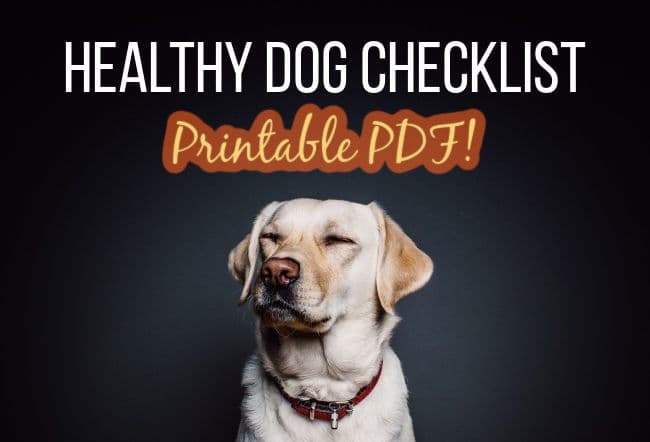FYI: If you buy something through a link on this site I may earn a commission - at NO extra cost to you.
Senior Dog Health Guide
It's not unusual for senior dog health to be impacted by some common conditions, either chronically or acutely (long term or sudden).
BUT it's by no means true that old dogs need to be sickly or weak, or be less able to enjoy life.
Good care during their lifetime (which includes a healthy diet, regular exercise and both routine and preventative veterinary care) can minimize problems later on.
Most dogs will experience some changes as they age, either physical or behavioral, but the vast majority can be managed and treated very successfully, allowing Fido to stay happy, healthy, active and comfortable throughout his days.
Some health conditions which are common in older dogs include:
- Arthritis
- Heart disease
- Kidney Disease
- Weight gain or weight loss
- Cognitive issues
- Loss of eyesight or hearing
- Dental problems
- Incontinence
- Cancer
- Loss of appetite
They may be appear slowly, have mild symptoms and become chronic, or may happen suddenly, with either mild or severe symptoms.
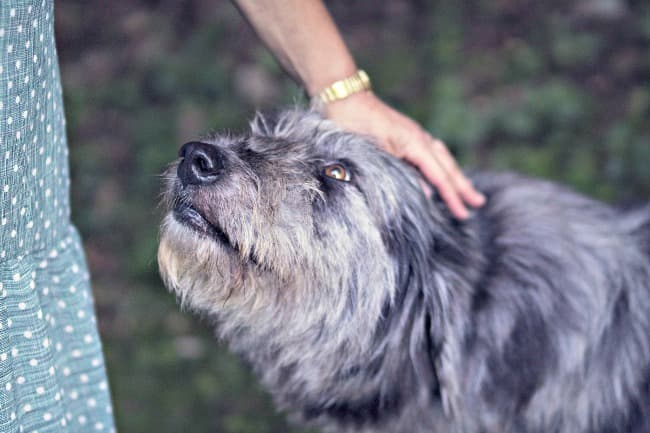
veterinary evaluation is important!
Any sudden symptoms, or changes in your dog's health or behavior, should be evaluated by your veterinarian quickly.
Even changes or symptoms which come on over a longer period of time and seem mild or innocuous should also be evaluated by your veterinarian in the same way.
Never try to diagnose/treat without getting a professional opinion first.
Arthritis in Older Dogs
Up to 25% of dogs are likely to suffer from arthritis in their lifetime, and the vast majority of them will experience this condition as they move into middle age and beyond.
Osteoarthritis is the type of arthritis which is most likely to be seen senior dogs. This is the degenerative form of the disease and is a result of years of wear-and-tear on your older dog's joints which causes inflammation and pain. It's most often seen in the hips, elbows, knees and/or shoulders.
Over time the cartilage which cushions joints begins to thin out and there is increased friction between the bones and joints themselves. This causes your dog to experience the characteristic pain and stiffness associated with arthritis.
Left untreated arthritis will
Symptoms of osteoarthritis in dogs
Symptoms of canine arthritis in senior dogs include:
- Difficulty or slowness in getting up from a lying down position
- Lameness or limping
- Loss of interest in walks/games/car rides
- Overall stiffness or loss of fluidity of movement
Sometimes there are other signs including:
- Whining, vocalizing, panting or pacing (signs of pain in dogs)
- Lethargy
- Loss of muscle mass
- Swollen joints
- Excessive licking/chewing at joints
- Loss of appetite
- Change in behavior (eg uncharacteristic irritability or aggression)
treatment for arthritis in old dogs
As with most conditions, the earlier you get a diagnosis and treatment plan implemented, the better the prognosis for your dog. So, if you notice any of the arthritis symptoms listed above please have your vet examine your dog asap.
There are several treatment options for older dogs with arthritis. They include prescribed medications, supplements and lifestyle changes. Using a combination of these options is likely to get you the best results but please remember never to give your dog any pharmaceutical medication without having your veterinarian prescribe or recommend it.
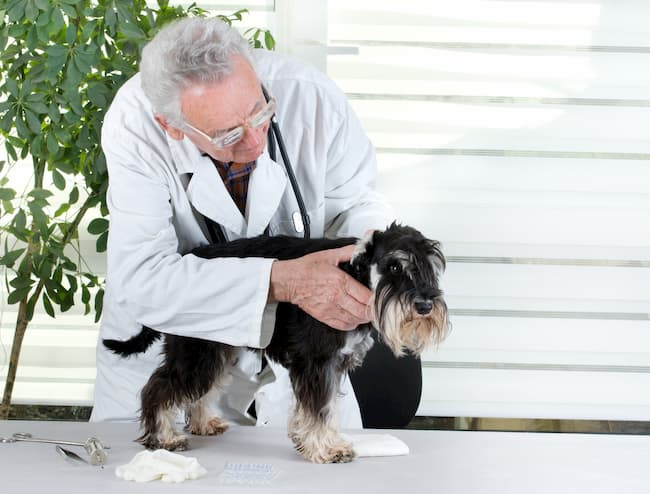
prescription medications
These include anti-inflammatory meds (NSAIDS) like the oral drugs Rimadyl, Previcox and Galliprant, as well as Adequan which is given as an intramuscular injection.
Pain killers such as Tramadol are sometimes used too, as well as corticosteroids such as Prednisone.
Some senior dogs have pre-existing conditions (such as heart or liver problems, diabetes etc.) which make certain medications unsuitable, even dangerous, for them to take. Your veterinarian needs to be aware of your dog's overall health and any other conditions in order to prescribe safely and effectively. Depending on the drugs used he may also need to monitor Fido's health with regular blood tests and liver function tests.
These are all powerful drugs and have a variety of side-effects, which can be more serious in older dogs than younger ones. It's important to ask your veterinarian about any potential side effects so that you can monitor your dog carefully and notify him/her if any occur.
NEVER give your dog any type of prescription medication without your veterinarian's knowledge or consent. Serious, potentially fatal, side effects can occur.
Also, NEVER give your dog human pain meds like ibuprofen or acetaminophen. Aspirin may sometimes be used under your veterinarian's guidance.
supplements & natural remedies
There are certain supplements that can help prevent, or at least slow down, the deterioration of cartilage which causes osteoarthritis as dogs age.
The most well-known of these are Glucosamine and Chondroitin (natural chondroitin from animal bones is preferred), which can slow down the progression of the damage as well as helping to relieve pain and stiffness. Some of the best natural supplements for dogs with osteoarthritis might include veterinarian formulated VetPro Complete Hip & Joint Chews which also include Turmeric which is a natural anti-inflammatory and MSM (Methylsulfonylmethane) which is a natural alternative to NSAID's for pain relief.
Bone broth is an excellent source of Chondroitin and dogs love it! It can be added to your old dogs regular food or given as a drink. Always choose a low-sodium option such as NutraPet's K9 Bone Broth & Hemp powder which can be sprinkled on Fido's food or simply add water to make the broth. It's super easy to use. You can also make your own homemade bone broth!
Crominex-3 is an Ayruvedic (a holistic sytem) supplement used to support your dog's joints as well as his circulatory system. Juvenate K9 is one example of this.
CBD oil is becoming an increasingly popular, and effective, choice for relieving pain and inflammation in dogs which stems from a variety of conditions, as well as being helpful for anxiety. Check out Chill Paws to see their product line and learn more about how CBD can help your dog.
Some alternative, or complimentary, therapies can also be used to help relieve the pain and stiffness of older dogs with arthritis. These include massage, acupuncture, hydrotherapy, laser therapy and even stem cell therapy.
tips to help old dogs living with arthritis
There are a few things you can do at home to help your senior dog feel more comfortable and move around safely. These include simple lifestyle changes and taking advantage of some specific products.
One big issue for older dogs with arthritis and joint problems is the difficulty they have walking on hard, slick floors. If your home has areas of wood or tile flooring it's extremely helpful to add rugs or carpet/non-slip runners to these areas. Doing this will prevent Fido's legs from slipping and sliding which aggravates any joint problems and can also cause injuries.
Carrying excess weight can put unnecessary strain on your dogs skeletal frame and joints, so keeping him at a healthy weight is also important. If your dog has packed on a few extra pounds with age, now is the time to help him lose those.
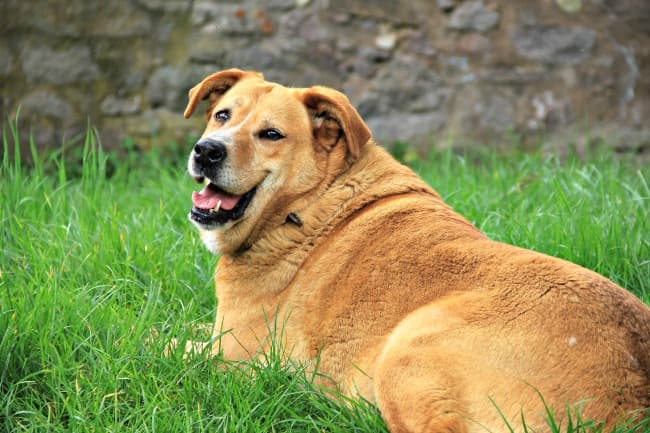
Regular exercise is as important for older dogs as it is for younger ones and keeping those old joints moving helps reduce stiffness and slow down deterioriation. However simple, relatively short, walks are the best choice for older dogs. Please don't encourage running or chasing as this could put too much strain on his joints and be harmful rather than helpful.
Products which can be beneficial for dogs with arthritis include ramps, steps (for getting on and off beds/sofas and in/out of cars for example) elevated bowls and orthopedic or heated dog beds.
Heart Disease in Senior Dogs
Dogs can have heart problems and heart disease in the same way humans can. There are several different types of heart conditions seen in dogs, including mitral valve disease, dilated cardiomyopathy, congestive heart failure and, (this is fairly rare), heart attacks.
As your dog ages his bodily systems and organs become less efficient, and weaken, this can lead to a number of chronic health conditions including heart disease. Mitral valve disease (MVD) and congestive heart failure are the most common in senior dogs.
The symptoms of heart disease in dogs include:
- Fatigue or lethargy
- Low tolerance for exercise
- Abnormal breathing patterns (too fast, too slow, labored etc.)
- Cough
- Behavior changes (eg. loss of appetite, disinterest in games)
- Weakness or collapse
Mitral Valve Disease in Senior Dogs
Mitral valve disease is very common in dogs, especially older ones, and studies indicate that up to 70% of senior dogs are affected.
As with many senior dog health conditions, this disease is a result of the normal degeneration that takes place in bodily systems and organs as they age.
Heart muscles and valves thicken and lengthen which causes heart malfunctions allowing blood to leak backwards into the left atrium of the heart causing additional strain on the heart muscles and a never-ending cycle of deterioration.
One of the first symptoms of mitral valve disease can be a heart murmur, so making sure your older dog has regular check-ups is an important step in early detection of heart issues like this. If MVD isn't caught early then other symptoms of heart problems (above) will develop over time, often leading to congestive heart failure and death.
Prevention is the best approach for MVD because there are no medications or surgeries that provide a cure, although there are treatments which may slow down the progression of the disease and others which can help a dog's body manage the symptoms of congestive heart failure.
Congestive heart failure leads to a build up of fluid in the lungs which puts additional pressure on the heart and obviously causes significant difficulty in breathing. Fluid can also leak into other areas/tissues including the abdomen and limbs.
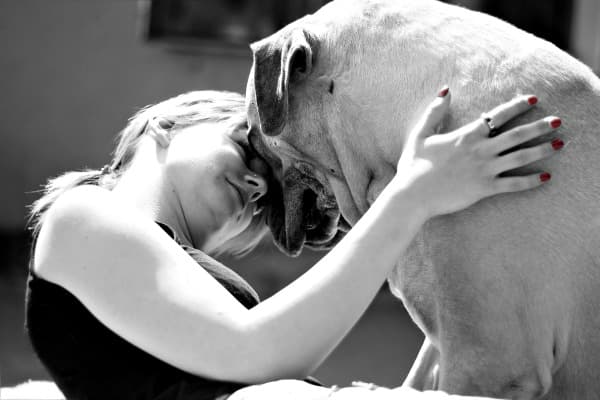
When MVD progresses into congestive heart failure there are additional symptoms that you may notice in your dog. These include:
- Excessive drooling
- Pale or blue lips, tongue or gums
- Difficulty breathing (labored)
- Abdominal swelling (due to fluid build up)
- Swelling of the limbs (due to fluid build up)
- Persistent cough (due to fluid build up)
Mitral valve disease can progress slowly and there may be years before symptoms begin to appear, but once they do most dogs have between a year and eighteen months of life left. The appropriate treatments and medications can make this time comfortable and allow a good quality of life (re: uvsonline.com).
Additional information on heart failure in dogs from cardiologists can be found HERE.
can heart disease in dogs be prevented?
While there are things you can do to help keep your dog's heart strong and healthy for longer, and minimize his chances of developing heart disease in later life, there is no sure-fire prevention method.
A healthy diet, regular exercise and quality veterinary care (including preventative routine care) are the obvious ones. Regular heartworm prevention is also important to protect from that particular threat.
Some breeds are more prone to heart disease than others and some heart conditions start early, others are degenerative and usually begin when Fido is middle-aged or older.
Kidney Disease in Older Dogs
The most common kidney problem seen in senior dogs is called chronic kidney disease. It can also be referred to as chronic kidney failure or chronic renal failure.
This sounds serious, and in advanced cases (when the kidneys are functioning at 25% efficiency or less) the bad news is that it is.
But, the good news is that for most elderly dogs, kidney function decreases fairly slowly over time. The term 'kidney insufficiency' might be a better description because what's happening is that your dog's kidney function is becoming less and less efficient as he ages, it's a slow degeneration rather than sudden, or complete, failure.
kidney failure symptoms
Unfortunately, symptoms of kidney failure in dogs are often well-nigh invisible until the disease has reached a fairly advanced state.
In fact, it's not unusual for the owner of a senior dog to find out that their pet has kidney failure as a result of a veterinary examination for another condition.
Some signs that could indicate your dog has kidney failure include:
- Increased thirst
- Increased urination
- Vomiting and/or diarrhea
- Weight loss
- Lethargy
- Sores or ulcers in the mouth
- Pale gums/lips/tongue
Of course, any and all of these can be symptoms of many other health conditions, some of them serious. If you notice any of them it's important to have your dog examined by your veterinarian as soon as possible.
The only way to diagnose kidney disease is through blood and urine tests which measure blood urea nitrogen (BUN) and creatinine levels, plus the concentration/dilution of urine.
Treating kidney disease in senior dogs
Depending on how far your dog's kidney function has decreased there are options in terms of treatment. Even dogs with 25% kidney function can often continue to live fairly normally for several years.
Of course, this depends on how quickly the condition is progressing, whether there are factors other than age involved, and your dog's general health.
For senior dog's who are experiencing kidney degeneration, and are not in a serious/critical condition, a veterinarian's focus will most often be on slowing down the progression of the disease, as well as setting up an at-home plan that will help to keep the dog stable and comfortable.
At home care and treatment for a senior dog with kidney disease or kidney failure can include:
- Feeding a high quality, low protein dog food
- 24/7 access to plenty of fresh drinking water
- Frequent potty trips
- Vitamin supplementation (water soluble is best)*
- Following the medication protocol given by your veterinarian
- Keeping your dog's environment/life as stress free as possible
Pet-Tinic Vitamin/Mineral supplement is one example of water soluble vitamin supplementation you could check out for this purpose.
As far as medical treatment goes, antibiotics, anti-nausea medications, blood pressure medications (to lower pressure in the kidneys), medications to keep calcium and phosphorous levels balanced, and antacids are all possibilities.
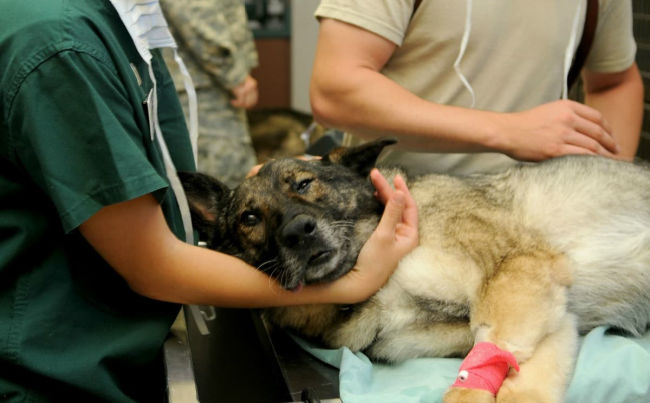
Your veterinarian may recommend 'flushing the kidneys' using IV fluids. This helps your dog's body to eliminate toxins which have built up in the kidneys and bloodstream due to the poor kidney function. Some dogs need to be hospitalized at the beginning of treatment, most do not.
Weight Gain or Loss in Senior Dogs
Senior dogs often lose or gain weight over time. Both of these can be natural age-related processes, but they can also be signs of a health problem or can lead to health problems.
If your dog is noticeably thinner, or fatter, than normal or if the weight gain/loss is sudden or extreme, it's important to have him examined by your veterinarian to rule out an underlying health condition.
Weight gain in older dogs
Obesity is a growing problem (no pun intended) for dogs of all ages. In 2018 a national study found that approx. 56% of dogs in the US were overweight or obese (petobesityprevention.org/2018).
The causes of weight gain in senior dogs include:
- Poor diet (eg. sub-optimal food, inappropriate formula, too many snacks)
- Slowing of metabolism (natural part of aging)
- Reduced exercise (due to health issues such as arthritis or heart disease etc.)
- Disease (such as thyroid disease, Cushing's disease, diabetes etc.)
- Medication side effect
- Water retention (due to disease or medications for example)
diet & weight gain in senior dogs
When we find a food that our dog likes, agrees with his digestive system and keeps him healthy, we tend to stick with it. That's natural! But it's important to remember that as Fido ages, his nutritional needs change and his metabolism slows down.
That favorite food might not be the best choice for him anymore, and could be contributing to unwanted, and unhealthy, weight gain.
A 'senior dog formula' might be a good choice, but not all are created equal and you need to consider your dogs needs, health, activity level and weight when choosing one.
Lower calorie diets can be appropriate for senior dogs who are carrying a few extra pounds. High quality protein sources are very important. Certain supplements can be beneficial, particularly Omega-3 fatty acids and antioxidants, but commercial food processing can destroy many of them so supplementing separately is often a better choice.
Choose healthy, low calorie snacks and treats and be sparing with them. Carrots, apples, green beans, celery and other veggies are perfect, if your dog will eat them. Ditto for fruits such as apples (without the core or seeds), blueberries, bananas or cantaloupe.
Or why not make your own? It's super easy to do and allows you to control the variety and quality of ingredients. Check out these yummy, low calorie dog treat recipes to see for yourself.

diseases which cause weight Gain in senior dogs
There are several diseases and conditions which can cause weight loss in older dogs.
The three most common ones are:
- Thyroid disease (specifically hypothyroidism)
- Cushing's disease
- Diabetes
Thyroid disease affects the metabolism, and if your dog develops hypothyroidism it means that the thyroid gland isn't producing enough of the hormone Thyroxine and his metabolism will consequently slow down. It generally doesn't show up until a dog is 'middle aged' or older.
One of the symptoms of an under-active thyroid is weight gain. Other symptoms include a dull or dry coat, hair loss, skin changes and lethargy. In female dogs the heat cycle may become irregular.
Thyroid disease in dogs can be treated with hormone replacement therapy.
Cushings disease also involves hormones (this time it's the hormone Cortisol) and usually appears during the middle years, or later. Symptoms of Cushing's disease in dogs include weight gain, pot belly, increased appetite and/or thirst, loss of muscle tone, hair loss, weakness and excessive urination.
There are treatment options for Cushing's disease, including the drugs Vetoryl, Lysodren and Anipryl.
Canine diabetes has the same cause as human diabetes, the inability of the body to produce enough insulin. Insulin regulates blood sugar levels and too little can have serious consequence. Symptoms of diabetes in dogs include increased thirst and urination, lethargy, rapid weight gain (or weight loss). Sometimes sudden onset blindness (due to cataracts) can be caused by undiagnosed diabetes, as can repeated UTI's, kidney and liver problems and more.
Dogs of any age can develop diabetes but, as with the two conditions listed above, it's more common in dogs of middle age and older.
Diabetes can sometimes be controlled with dietary changes but many dogs need to be given regular insulin injections to help their blood sugars stay level. With a little practice this is very do-able.
Weight Loss in Older Dogs
It's not unusual for senior dogs to lose weight. Loss of muscle mass, picky appetites and a reduction in the effective absorption of nutrients can cause weight to drop. Usually this happens fairly slowly and as you'll probably notice it first it's important to mention it to your veterinarian so he/she can monitor it at regular check-ups and investigate if there are other symptoms or concerns.
Sudden weight loss however can be a sign of underlying illness or disease and always needs to be evaluated by a veterinarian quickly.
If your dog looks noticeably thin, or thinner, (whether it happens suddenly or not) there are several possible causes including:
- Dental problems
- Poor absorption of nutrients from food
- Loss of muscle mass due to aging
- Dehydration
- Disease or illness (including diabetes, kidney or gall bladder disease, heart conditions, cancers)
dental problems & weight loss in senior dogs
Dental problems can cause your old dog to lose weight due to difficulty eating or chewing, drools excessively, has terrible breath and/or noticeable gum issues such as bleeding or swelling, he may well have broken or decaying teeth, an abscess or gum disease.
All of these things can cause pain when chewing and a decrease in the amount of food Fido eats, which obviously leads to weight loss.
In addition to weight loss, poor dental health can lead to all sorts of health issues. Bacteria from the mouth can enter the bloodstream and travel throughout Fido's body, causing problems in all major organs.
Regular dental cleanings and good dental hygiene can not only prevent these issues from occurring later in your dog's life, but add years to it!
food absorption & weight loss in Older dogs
Like all other body systems and organs, the digestive system can become less effectively with age. A sensitive stomach can also become more sensitive, or less so at times.
This can mean that the food your dog has eaten his whole adult life no longer meets his nutritional and health needs and this results in weight loss (which is generally slow, and fairly minor in nature, but can become worse if not addressed).
A premium dog food with high quality ingredients is going to be more digestible, and provide more nutrients per cup, than a generic or poorer quality food. It will also be free of many of the additives and fillers which have no nutritional value and can cause health problems.
It's a good idea to get advice and recommendations from your veterinarian about dietary changes for your senior dog as his knowledge of your dog's health and history can be helpful.
If your senior dog gets a clean bill of health from your veterinarian but you need to help him eat more and stop the weight loss, check out the tips below.
Cognitive Issues in Older Dogs
Just as with humans, it's not only physical functions that deteriorate with age, neurological (brain) function often does too.
A large number of older dogs will develop what is often called Old Dog Syndrome, but more correctly termed Canine Cognitive Dysfunction Syndrome (CCD or CDS) by veterinarians.
It is similar to dementia, senility or Alzheimer's in humans. The signs can come on gradually over time, or appear relatively suddenly.
There are many different symptoms of canine cognitive dysfunction, some of the most common ones:
- Restlessness (pacing, roaming, aimless circling etc.)
- Changes in sleep patterns (eg. waking up at night/sleeping more/less)
- Shaking, tremors, panting (classic signs of stress or anxiety)
- Changes in personality ( irritable/aggressive/depressed)
- Disorientation or confusion in familiar surroundings
- Loss of bladder/bowel control
- Uncharacteristic vocalizations (unusual howling, whining, barking)
- Dysthymia (loss of awareness of body size or positioning)
- Blanking out (staring into space or being unresponsive to voice etc.)
- OCD or repetitive behavior patterns
- Separation anxiety when left alone
- Disinterest in affection and/or decreased social interaction
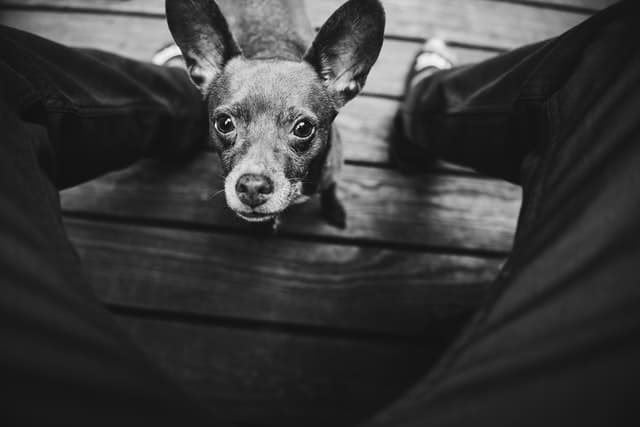
Many of these signs can go unnoticed as they appear gradually and it's easy to just put them down to old age. Although there is no cure, there are lifestyle changes, medications and natural supplements which can help reduce some symptoms and make life easier for your dog (and everyone else too because a dog with CCD can be disruptive and time consuming).
If you notice symptoms of cognitive dysfunction in your older dog it's always a good idea to talk to your veterinarian about what you're seeing. First of all you want to rule out any underlying or unrelated physical condition which could be causing the symptoms. Secondly, your veterinarian can give you suggestions and recommendations that will help you handle the situation and even prescribe medications or recommend other treatment options if either are appropriate.
Head tilt? unusual eye movements? dizziness?
These symptoms generally do not point to cognitive decline, but to a totally separate condition called Old Dog Vestibular Disease. Although the symptoms can be sudden and severe, the condition itself is generally benign and self-limiting (ie it resolves itself given time and often without treatment).
Peripheral vestibular syndrome is the most common, and it affects the ears which are the center of balance. If you've ever suffered from vertigo you will understand how a dog feels when affected by this.
Symptoms of this condition include a noticeable head tilt, loss of balance and co-ordinations, erratic and unusual eye movements, nausea and sometimes vomiting. Some dogs lose bladder/bowel control.
Old dog vestibular disease can be the result of an ear infection, damage to the ear drum, a viral infection, inflammation in the ear or even a neck injury. It can also be caused by certain medications (such as the antibiotic Metronidazole).
If your dog shows these symptoms it's important to have him checked out by your veterinarian as he may need medications for an infection, or inflammation. Anti-nausea medications might be prescribed or suggested to help your dog feel better.
Your vet will also be able to rule out a more severe condition called Central Vestibular Disease which can be caused by brain injury, a stroke, Rocky Mountain Spotted Fever, systemic infection or a thryroid problem.
Symptoms of peripheral vestibular disease will usually improve within a few days (even if no underlying health condition was found or treated) and will taper off entirely within two or three weeks. Some dogs can take up to six weeks before they're back to normal.
help for dogs with COGNITIVE dysfunction
Here are a few things you can do at home to help your dog if he's showing signs of having old dog syndrome.
Make sure your dog gets regular physical and mental exercise.
Of course senior dogs generally shouldn't be running around outdoors but regular short walks (or strolls) are important for the fresh air, change of scene and socialization as well as the actual act of moving. If your dog has trouble walking using a doggie stroller or a little wagon can work great. Let him walk as far as he's comfortable then hop in the transport you've provided! Win-win.
Keep his brain engaged by talking to him, encouraging interaction and even try a few of the interactive dog toys on the market. The ones that hold treats are often very popular and while a dog may lose his sight or hearing over time, his nose tends to work well regardless of age.
Feed a premium diet and supplements if necessary.
Either buy a premium dog food with top quality ingredients or make your own food for Fido. Getting the balance of nutrients right is important and adding antioxidants (eg. Vitamin E) and Omega-3 fatty acids may help slow down brain cell degeneration. Dog food manufacturing process that use high heat tend to destroy added vitamins, minerals and antioxidants, so even if your chosen dog food contains these supplementation is also suggested. Coconut oil can be added to any food you use and is good for brain health.
Keep home life and routines predictable
Older dogs who are experiencing cognitive dysfunction are easily confused, scared and disoriented. If their familiar 'landmarks' (both physical and intangible) are altered, it increases their difficulties. By keeping your daily routine (meal times, food, outings, bedtime etc.) consistent they have a framework which builds security. It also helps to resist rearranging furniture as this can cause distress. If Fido is also experiencing a decline in his vision he will be even more lost when his environment changes.
Medications and supplements
Medications and supplements may help and for dogs with mild to moderate symptoms the option with the least side effects is natural supplementation.
There is one medication which is FDA approved for treating canine cognitive dysfunction, it's called Anipryl and your veterinarian can give you all the info. you need. Fido will need to be monitored regularly by your vet while taking it because there are potential side effects and medication interactions. But for some dogs it seems to make a real difference.
When it comes to natural supplements and products there is more choice. Senilife contains a blend of antioxidants which can help to improve brain function and health, as well as slow down cognitive decline. Dogs who were given this supplement in a pilot study showed significant improvement and reduction in CCD symptoms. My daughter had an elderly rescue dog who developed old dog syndrome after a few years with her. Cookie (the dog!) really improved cognitively after a veterinarian suggested an antioxidant formula called ProNeurozone. Other options include products which contain SAMe (S-Adenosyl-l-methionine) which improves cognitive function and supports liver health. Examples of these include SAMeLQ225, and Denosyl.
For dogs with moderate to severe CCD there are some prescription medications which might help. These include Anipryl and Memantine.
Reduce Sundowning symptoms
Sundowning is the term used to describe the increase in agitation and increasing severity of CCD symptoms which often starts around dusk and continues during the overnight hours. For reasons not fully understood this is a phenomena which affects some people with Alzheimers and some senior dogs with canine cognitive dysfunction/doggie dementia. Keeping lights on full during the evening (and even nighttime) hours can help. Natural treatments for anxiety can reduce symptoms as can anti-anxiety medications. If your dogs symtoms/behavior/anxiety increases in the evening, talk to your veterinarian.
Vision and Hearing Loss in Older Dogs
As Fido gets older it's not unusual for his eyesight and hearing to become less acute and is often just part of the natural aging process. Some conditions can be treated, others just have to be managed.
If you notice any signs of vision problems or eye pain/discomfort in your dog it's important to have your dog evaluated by your veterinarian right away. Only a professional can determine exactly what is going on with your dog's eyes and eyesight and recommend a plan of treatment or management.
senior dog vision problems
Your old dog's eyesight may well not be what it was, and there are several possible reasons for this including cataracts, glaucoma and retinal atrophy/degeneration.
Symptoms of vision loss can appear slowly over time, or come on suddenly. In familiar surroundings dogs can compensate for failing eyesight pretty effectively and you may not even realize there's a problem until Fido is in a new or different environment.

Cataracts are fairly easy to see as the eye becomes cloudy and white over time. However many senior dogs undergo a similar change where the eye becomes cloudy and looks blue/white. This is called nuclear sclerosis and doesn't seriously affect your dog's vision. True cataracts however do. Only your veterinarian can tell the difference for sure so if you notice these changes please have Fido examined so that you know what you're dealing with. If your dog develops cataracts in both eyes and loses his vision entirely he may be able to have corrective surgery, again your veterinarian is the person to discuss this with.
Glaucoma is caused by a build up of fluid in the eye and is both painful and dangerous. It can occur slowly or suddenly and requires urgent veterinary evaluation and treatment to avoid permanent blindness. Some breeds have a genetic predisposition to glaucoma (including Beagles, Cocker Spaniels and Basset Hounds). Sometimes an eye injury or trauma, or an infection or inflammation can be the root cause.
Symptoms of glaucoma in dogs include redness or irritation of the eye, cloudiness, excessive tearing or drainage, squinting, avoidance of bright light. Because it hurts, if your dog has glaucoma he may rub at his eye with his paw, or rub it on the carpet or against furniture.
Glaucoma is treated by reducing the pressure within the eye. Medication is usually the first method used, if it isn't effective there are also surgical options.
Retinal Atrophy/Degeneration
The most common type of retinal problem in senior dogs is Progressive Retinal Atrophy (PRA) which happens as the cells in the retina deteriorate with age. With this condition Fido will gradually lose his sight, beginning with his nighttime vision and complete blindness could happen within a year or two. Physical symptoms of PRA include dilated pupils, increased reflectivity of the eye in bright light. There is no pain involved for your dog but also no current treatment.
There is a more rare condition called Sudden Acquired Retinal Degeneration (SARDS). As the name suggests this comes on suddenly and causes blindness within days, or weeks. It's most often seen in middle aged to senior dogs and around 80% of dogs diagnosed are female. Veterinarians and researchers don't yet understand why SARDS happens and studies are ongoing. There is a genetic component and the breeds most at risk of developing this condition include Dachshunds, Miniature Schnauzers, Pugs, Brittany Spaniels and Maltese.
hearing loss in older dogs
If you have an senior dog, it's likely that his hearing has (or will) become less acute. Age-related hearing loss in dogs is totally normal and usually starts when Fido is moving from middle age into old age.
It's a gradual process that happens as the chochlea deteriorates. It begins with difficulty in hearing high pitched sounds, then progresses to mid pitch, and eventually to the whole range of sound.
Because this all happens slowly and gradually it's not unusual for the early stages of deafness in older dogs to pass unnoticed, but as it progresses you may start to notice some signs of hearing loss including:
- Failure to respond to name or voice commands
- Sleeping through noises that would normally have woken him
- Difficulty figuring out where a noise/sound is coming from
Although there is no cure for age-related hearing loss in senior dogs but there are things you can do to help your dog cope better with his new reality.
help for older dogs with hearing loss
When you notice that your older dog is starting to show signs of hearing loss it's important to have him examined by your veterinarian right away. If he's a senior dog with no other symptoms it's most likely an age-related problem but there are other conditions that could be to blame and it's important to rule those out.
Once you've determined that Fido's loss of hearing is due to age here are some steps you can take to make life easier for you all....
Start using hand signals along with voice commands so your dog can learn the visual cue before he loses his hearing gets worse, or disappears.
In addition to hand signals you can use vibrations rather than sound to get your dogs attention. Use a flashlight, clap your hands, stamp your feet... he will be able to feel/see these actions even if he can't hear them.
Be slow and deliberate when approaching your dog so as not to startle him. Also wake him up gently and carefully because he won't be able to hear you coming.
Take extra care to keep Fido safe. He may no longer be able to hear cars or bicycles approaching, same for people/dogs/cats etc. Always keep him leashed when you're outdoors (or not in a safely fenced area) and be on the lookout for potential problems ahead of time.
Make sure your dog's ID tag tells people he's deaf, if he gets lost this is important information. You either inscribe/write an addition on his regular tag or get a separate one for that sole purpose.
Be calm, patient and understanding because if your old dog is deaf, life is more difficult for him right now. He may also be losing his sight, making it tricky and disorienting to negotiate the world that is not so familiar anymore. If he's anxious already, you need to be extra calm so he doesn't feel more agitated.
Dental Problems in Older Dogs
As dogs get older the health of their teeth and gums often deteriorates. Veterinary research shows that approx 85% of dogs who are older than four have gum disease, often alongside broken, decayed or damaged teeth.
Because oral health is so important to overall health, it's very important to treat any signs of dental problems promptly. Bacteria in the mouth can enter the bloodstream and cause systemic inflammation, affecting even the heart. Good dental care and oral hygiene while a dog is younger (regular teeth brushing and cleaning) goes a long way toward preventing serious problems later on.
Common symptoms of dental issues in dogs include:
- Bad breath
- Tartar buildup
- Red, swollen or bleeding gums
- Chipped or broken teeth
- Tooth decay
- Excessive drooling
- Difficulty chewing (or loss of appetite due to difficulty eating)
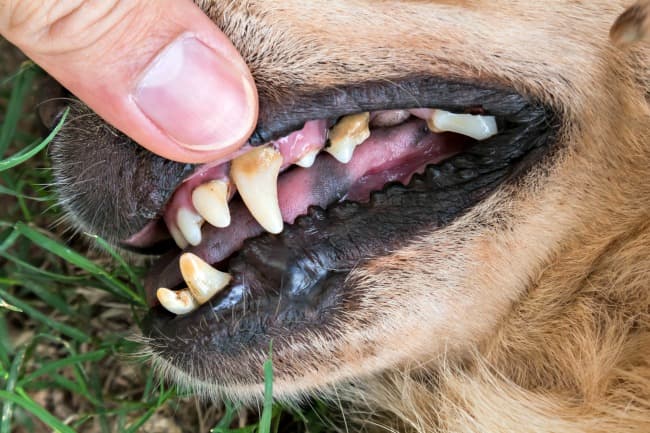
It's also possible that your dog can have dental disease or problems with his teeth without showing specific symptoms. If this has progressed to affect his overall health you may notice a general malaise which could include loss of appetite, lethargy, disinterest in exercise or socialization etc.
treating senior dog dental problems
If you notice any of the symptoms above the first step is to have your dog examined by your veterinarian so you can find out what is causing them.
Removal of tartar buildup and/or broken and decayed teeth is the most likely first step and will have the biggest impact in terms of improving Fido's oral health.
Both of these procedures require a general anesthetic so your veterinarian will make sure your senior dog is healthy enough to handle them. Most senior dogs ARE completely fine with anesthetics but blood work and other tests should be done first in order to rule out any underlying issues.
Antibiotics may also be prescribed if there is infection in the gum or bone, or there are abscesses.
After the cleaning and extractions, regular teeth brushing and a healthy diet are very important if you want your dog's gums to return to a healthy state and the remaining teeth to stay healthy.
Dog dental care products such as dental chews, tartar control water additives (such as Arm & Hammer Advanced Care Dental Water Additive), dental wipes and more can help keep tartar at bay.
Incontinence in Old Dogs
It's not unusual for an old dog's bladder control to be less than stellar, and there are a variety of reasons for this including:
- Weakening of the sphincter muscle
- Hormonal issues
- Kidney failure
- Cognitive issues
- Neurological or spinal disease
- Generalized loss of muscle tone due to age

Loss of bowel control is less common, but can happen. It's most often related to cognitive problems, spinal or neurological conditions or muscle weakness.
I have a full article on dog incontinence and there is a section related specifically to this condition in old dogs which you can see HERE. This section also links to a short article written by veterinarian Dr. Megan Teiber DVM on dog incontinence.
how to manage old dog incontinence
If your senior dog is having issues with bladder (and/or bowel) control, the first step, as always, is to have him examined by your veterinarian.
In order to treat and manage the problem you need to know the cause. Incontinence is a symptom of an underlying health issue. It could simply be age-related muscle deterioration and need to be managed rather than treated. But other causes such as spinal disease or kidney problems need to be treated.
CLICK HERE to get comprehensive advice and information on treating incontinence in dogs of all ages and due to a variety of conditions (link opens in new window). You'll find a section specifically related to senior dogs as well as a wealth of tips to help you keep old Fido comfortable while protecting your home and belongings.
Cancer in Senior Dogs
Cancer is the #1 cause of death for dogs over 10 years old, and research indicates that it affects more than 50% of senior dogs.
The most common types of cancer in dogs are:
- Bone cancer
- Hemangiosarcoma (can cause tumors anywhere in the body)
- Lymphoma (cancer of the blood and lymph system)
- Mast cell tumors (skin cancer)
- Melanoma (skin cancer, often affects the mouth)
Because there are a number of different cancers which can affect completely different areas of your dog's body, there are a correspondingly wide range of cancer symptoms.
These symptoms are often also symptoms of other conditions and diseases, and some cancers don't cause any noticeable symptoms until they are very advanced.

Some symptoms of cancer in dogs can include:
- Lumps or bumps
- Enlarged lymph nodes
- Sores or wounds that won't heal
- Swelling anywhere on the body
- Lameness
- Unusual bleeding
- Loss of appetite
- Weight loss
- Repeated vomiting and/or diarrhea
- Chronic cough
- Lethargy
The earlier cancer is diagnosed the better chance your dog has of recovery. If you notice any of the above symptoms, or even if you just feel that something is 'off' or not normal, get your dog examined by your veterinarian right away.
Cancer treatment for dogs
There are a variety of cancer treatment options for dogs. Which one, or more than one, is right for your dog depends on what type of cancer he has and how advanced it is.
Your veterinarian can give you that information and will then recommend appropriate treatment. Options can include surgery, radiation and chemotherapy, either singly or in combination with each other.
When caught early cancer can be treated, and possibly even cured.
The prognosis and outcome of treatment depend on many things including type and stage of cancer, your dog's overall health and your financial ability. Thanks to advances in veterinary care, cancer does not have to be the death sentence it used to be and regardless of age, most dogs respond well to the appropriate treatment.
Early diagnosis obviously improves the odds of recovery (this is true for all health conditions) so always consult a veterinarian right away if you notice your older dog showing symptoms of illness or behaving uncharacteristically.
Loss of Appetite in Senior Dogs
If your old dog won't eat there are a variety of possible causes, some of them serious, others less so.

It's not uncommon for dogs to eat less as they age, this is normally a slow process and doesn't cause a significant, or sudden, change in their weight.
If your dog stops eating suddenly, or is consistently losing weight it's likely there is a health condition at the root of the problem.
Reasons for an old dog not to eat can include:
- Natural decline in appetite due to aging
- Dental problems
- New food or dietary change
- Stress or anxiety
- Different routine
- Major change within the family or household
- Underlying disease (heart problems, cancer, cognitive decline etc.)
If the loss of appetite is sudden, or there are other symptoms present, having your dog examined by your veterinarian is an urgent need.
Weight loss and loss of appetite that happens slowly over time is not an emergency, but you still need to take your dog for a full veterinary exam to make sure that there is no underlying health condition that needs to be treated.
how to encourage an old dog to eat
Getting old dogs to eat, even healthy old dogs, can sometimes be a bit of a challenge, but it's important to encourage Fido to eat so that he gets the nutrients his body needs.
Once your veterinarian has ruled out a health condition, it's up to you to find a way to get your older dog to eat. There are a lot of different tips and tricks you can use to accomplish this.
Check out THIS PAGE for tips and advice on what you can do to help an old dog who won't eat. You're bound to find something that will work for your golden oldie.
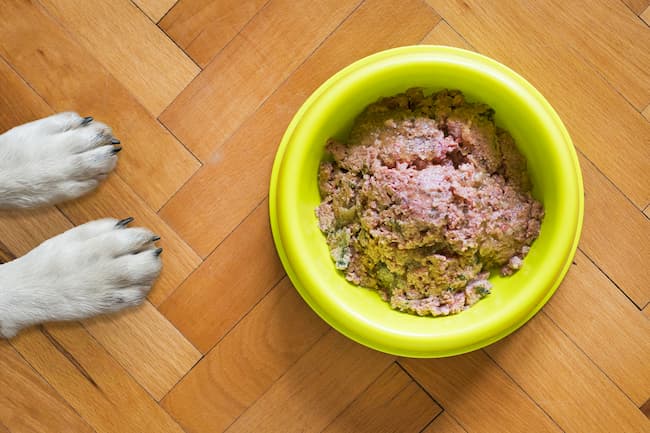
you might also like...
- Home
- Senior Dog Health
FTC Disclosure: Some pages on this site contain affiliate links. I may earn on qualified purchases.
